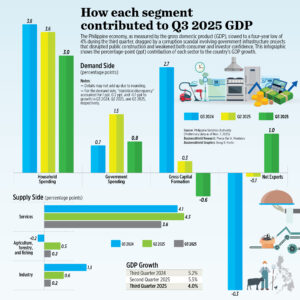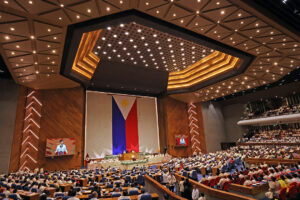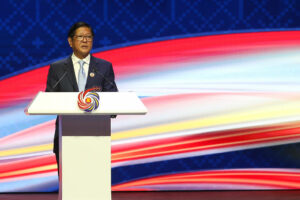By Kenneth Christiane L. Basilio, Reporter
CONGRESSMEN on Wednesday opened discussions on amending the 1987 Philippine Constitution, a long-running political initiative pushed in the House of Representatives but one that has struggled to gain support in the Senate.
The House Constitutional Amendments Committee reviewed several Charter change (Cha-cha) proposals, ranging from easing foreign ownership and strengthening territorial claims in the South China Sea to lowering the minimum age for President and Vice-President and clarifying impeachment rules.
“All of these proposals that I have seen presented to the committee have great merit,” Deputy Speaker and Antipolo Rep. Ronaldo V. Puno told the panel. “Although there are different specifics in each of these resolutions, the general objective is the same.”
Moves to amend the Constitution have been a recurring theme in Philippine politics, but previous attempts have always faltered due to lack of support from the public and the Senate, driven in part by concerns about political motives.
“We should try to adopt a measure that will have a good chance of passing in the Senate,” said Mr. Puno.
The House passed a resolution in 2023 supporting a constitutional convention, and a year later, pushed joint discussions on amendments by both chambers of Congress. A signature drive to support Cha-cha also fizzled amid allegations that lawmakers were behind the initiative.
Lawmakers last year brought Cha-cha discussions to the full plenary under a Committee of the Whole, in a move that drew wide public attention and had marked the Marcos administration’s most extensive push for constitutional amendments.
Also on Wednesday, the National Unity Party said its members filed a measure seeking to convene a constitutional convention that would tackle amendments to the 38-year-old charter, which it described as lacking in “textual precision.”
The 43-member political party pushed for House Bill (HB) No. 5870 to offer a more “prudent, participatory and legitimate mechanism for reform” to pacify fears that lawmakers might politicize changes to the Constitution if they do it themselves.
“This measure seeks to fulfill — not discard — the 1987 Constitution: to correct its errors, complete its intent and reinforce its authority with clarity and coherence,” the office of Mr. Puno, who heads the second largest political party in the lower chamber, said.
The proposal calls for convening 150 delegates from the country’s administrative regions, with each region allotted three delegates and additional seats allocated by population to ensure balanced representation. Elections would take place on May 11, 2025, according to the bill.
“There will be no appointive delegates, unlike in previous conventions, to further insulate it from political influence,” it said, noting that delegates must be natural-born citizens, at least 25 years old, holders of college degrees and independent from political office.
The delegation would be required to wrap up Cha-cha discussions a year after being convened, according to the measure.
BREEDS CORRUPTION AND DYNASTIES
“We need to amend the Constitution because it breeds corruption and political dynasties,” Isabela Rep. Antonio T. Albano told the committee. “All the ills that you see now, in what is happening to the country, is because we have not amended a single iota of this Constitution.”
He said political dynasties had tightened their grip on the system, pointing to what he saw as weaknesses in the charter.
The Philippine Constitution prohibits political families but was never enforced due to a lack of enabling law. Dynasties have to be clearly defined to prevent curtailing the right to participation, said Mr. Albano. “How can you say that there is a political dynasty when they are voted into office?”
House Speaker Faustino “Bojie” Dy III had said the chamber will begin talks on an anti-dynasty bill as Congress is on the last leg of the session this year.
“We remain deeply skeptical,” a group of minority congressmen said in a separate statement. “History has shown us that political dynasties themselves have repeatedly blocked genuine reform.”
The Makabayan bloc urged the House leadership to fast-track their versions of anti-political dynasty bills, which it described as containing “clear and uncompromising provisions.”
“Is the promise real, or just another show?” Party-list Reps. Antonio L. Tinio, Renee Louise M. Co and Sarah Jane Elago said.
President Ferdinand R. Marcos, Jr. should consider anti-dynasty legislation as a legislative priority, former Party-list Rep. Carlos Isagani Zarate said in a separate statement.
Party-list Rep. Jose Manuel Tadeo I. Diokno said the Senate, too, should follow the House’s steps and consider passing a bill against political families.
“Filipinos have long awaited legislation against political dynasties,” he told reporters in Filipino. “In the House, we will strive to push the bill forward.


















